5 Nov 2009
Sweden in Transition
(Naresh Giangrande recently returned from a Transition Training tour of Sweden, here is a short report about his trip).
I spent a intensely satisfying afternoon with the students of a Folks school in Gotenberg exploring how to tell positive stories of the future especially around climate change. We explored topics like how to tell stories that changed peoples heart and mind, how to tell stories about systems, resilience, and my favourite ‘how do you tell stories about the future’. They invited me to join them because the course tutor had heard of my visit and she thought that having someone from a positive movement about climate action would stimulate and inspire students. It certainly inspired me to work with switched on and passionate teenagers!
The Folk School system –incredibly- is part of and paid for by the state (as are many of the ‘alternative school like Steiner schools). There are 160 pre-university Folk schools, Folkhögskola, in Sweden formed over 150 years ago; some are run by the church and other by labour unions and other by environmental organisations with an extraordinary level of choice of what and how is studied. Coming from the UK where just about every area of education is codified and predetermined, sans serendipity it felt bewildering!
 Similarly I gave an evening talk to over 80 in Jarna to a class studying environmental issues at a Steiner school (and members of the public). I threw away the script and had an uncomfortable start but an ultimately equally satisfying evening exploring the concept of Transition with them. I hope they understood that Transition is a process of ‘throwing away the script’! I was hosted by Peter and his community on a small farm who are of course putting in place many pieces of a resilient small holding, and I was introduced to the wonderful Swedish clay stove, one of many on my trip (see right).
Similarly I gave an evening talk to over 80 in Jarna to a class studying environmental issues at a Steiner school (and members of the public). I threw away the script and had an uncomfortable start but an ultimately equally satisfying evening exploring the concept of Transition with them. I hope they understood that Transition is a process of ‘throwing away the script’! I was hosted by Peter and his community on a small farm who are of course putting in place many pieces of a resilient small holding, and I was introduced to the wonderful Swedish clay stove, one of many on my trip (see right).
Cemus has been developing for over 10 years a new and challenging model for universities. Formed by students who design the courses and curriculum in response to the lack of environmental modules at Uppsala University – the biggest in Sweden- we had an afternoon discussing Transition and how Cemus might be a model for starting Transition Universities. Rather than having to start something new this is a way to create courses in environmental subjects that can bolt onto any university curriculum, a self organising piece of the university.
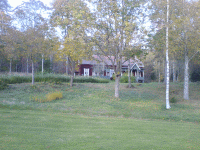 The first Training for Transition in Sweden, was held at Sätra Brunn (see left), an ancient healing centre founded amongst 9 wells which have purported healing qualities. This weekend was attended my most of the founding members of the Transition Sweden initiating group and 17 others from a wide area of Sweden. Myself and Paul Hendriksen from the Transition Netherlands coordinating group facilitated the weekend in this beautiful and historic place. I was surprised at the range of people attending, many of whom had never done this sort of work before. Almost all commented on the ‘Inner Transition’ and our Joanna Macy structures. It is the fusion of inner personal development work and outer social change and environmental issues that constantly delights participants on our training. It seems to ‘fill in a blank’ that for most seems compelling, strengthening, and surprising.
The first Training for Transition in Sweden, was held at Sätra Brunn (see left), an ancient healing centre founded amongst 9 wells which have purported healing qualities. This weekend was attended my most of the founding members of the Transition Sweden initiating group and 17 others from a wide area of Sweden. Myself and Paul Hendriksen from the Transition Netherlands coordinating group facilitated the weekend in this beautiful and historic place. I was surprised at the range of people attending, many of whom had never done this sort of work before. Almost all commented on the ‘Inner Transition’ and our Joanna Macy structures. It is the fusion of inner personal development work and outer social change and environmental issues that constantly delights participants on our training. It seems to ‘fill in a blank’ that for most seems compelling, strengthening, and surprising.
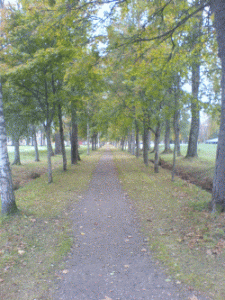 In a short period of time we find away to connect an individual to the earth, and to his or her social and political world; a frightening but deeply moving prospect in a world undergoing such tectonic shifts ! We can be ourselves in this movement , finally we don’t have to leave any of ourselves out in Transition; which is I think part of what is so exciting and compelling. I think this ancient healing site also helped us conduct our 2 day journey in Transition. We were also helped by the indoor swimming pool, sauna, and a troop of outrageous women acappella singers who performed for us on Sunday over another sumptuous feast.
In a short period of time we find away to connect an individual to the earth, and to his or her social and political world; a frightening but deeply moving prospect in a world undergoing such tectonic shifts ! We can be ourselves in this movement , finally we don’t have to leave any of ourselves out in Transition; which is I think part of what is so exciting and compelling. I think this ancient healing site also helped us conduct our 2 day journey in Transition. We were also helped by the indoor swimming pool, sauna, and a troop of outrageous women acappella singers who performed for us on Sunday over another sumptuous feast.
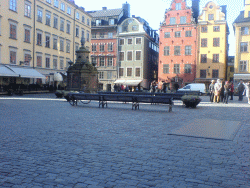 Transition Sweden also took advantage of my trip to promote their ideas, hosting a number of press interviews with P1 the Swedish national radio, and local radio, a blogger named Johan, and several newspapers who turned up to a press conference at the headquarters of Hela Sverige Ska Leva, an association of rural communities that hosts Transition Sweden, at their headquarters in the old square in Stockholm (see left).
Transition Sweden also took advantage of my trip to promote their ideas, hosting a number of press interviews with P1 the Swedish national radio, and local radio, a blogger named Johan, and several newspapers who turned up to a press conference at the headquarters of Hela Sverige Ska Leva, an association of rural communities that hosts Transition Sweden, at their headquarters in the old square in Stockholm (see left).
I also did talks for the newly formed Transition Initiatives in Uppsalla, Jarna, and Gotenberg. I also talked to the SNF the largest nature conservation society in Sweden and Effekt – a new magazine dedicated to climate issues with the Transition movement featured on their inaugural front cover.
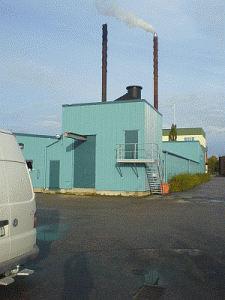 Sweden is way ahead of anything we are doing in the UK in terms of putting in place the physical infrastructure that will make us resilient as we lose our fossil fuels. This is because they have no fossil fuels, but rather lots of natural resources, and a small population. They are the only European country, despite living a high energy and consumption lifestyle, that is within its ecological footprint. A visit to SHE, the local energy company of Sala (see right) showed why.
Sweden is way ahead of anything we are doing in the UK in terms of putting in place the physical infrastructure that will make us resilient as we lose our fossil fuels. This is because they have no fossil fuels, but rather lots of natural resources, and a small population. They are the only European country, despite living a high energy and consumption lifestyle, that is within its ecological footprint. A visit to SHE, the local energy company of Sala (see right) showed why.
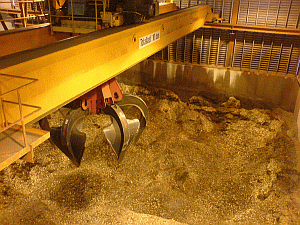 This is an 100% locally owned energy company who delivers not only electricity but hot water, central heating, and broadband to their customers who are more than 60% of the people of Sala and Heby. All of their energy production is renewable, mostly combined heat and power burning biomass, but with a bit of bio fuels and solar pv (see left). Most of the electricity generated in Sweden is from non fossil fuels, with a mix of renewable, hydro and nuclear, and with many small scale community owned power companies like the one I saw in Sala. The cost of energy is less then 50% of what it would cost from fossil fuels so it makes economic sense. Any Transition Initiative that wants to see how to do it should come to Sweden- it works!
This is an 100% locally owned energy company who delivers not only electricity but hot water, central heating, and broadband to their customers who are more than 60% of the people of Sala and Heby. All of their energy production is renewable, mostly combined heat and power burning biomass, but with a bit of bio fuels and solar pv (see left). Most of the electricity generated in Sweden is from non fossil fuels, with a mix of renewable, hydro and nuclear, and with many small scale community owned power companies like the one I saw in Sala. The cost of energy is less then 50% of what it would cost from fossil fuels so it makes economic sense. Any Transition Initiative that wants to see how to do it should come to Sweden- it works!
My final reflection is that Sweden has many wonderful pieces of the Transition to a sustainable society. However these pieces are spliced onto an industrial growth society which makes the whole thing, of course, unsustainable. Take out the industrial growth beliefs and processes and you would have much of what we need to live well. Perhaps Transition Towns can stimulate this missing piece and enable Sweden to make the turn, the transition, rather quickly by stimulating the national debate about where we are headed. Maybe.
Naresh Giangrande

ceridwen
5 Nov 9:02am
….and THAT is the clue methinks. Your comment about Sweden being the only European country that is within its ecological footprint despite living a high energy and consumption lifestyle AND “a small population”. That is the single biggest thing that I cant get my head round – ie why people just cant seem to realise that life could/can carry on very much “as normal” PROVIDED there is “a small population”.
Give me the choice being living a similar lifestyle to the one I have now in a country with “a small population” and living in a vastly overpopulated country and being expected to “ratchet back” my lifestyle to accommodate all those extra people – then its simply no contest – bring on the smaller population every time – no question about it.
As someone said to me “just what do we do about all those extra people we have right now in Britain for instance?” and that is a very valid point. Many countries (and that includes this one) have WAY too many people – and there is nothing that can be done about that – and so we have to adapt as best we can to that uncomfortable fact, whilst waiting for the size of the population to naturally decline. But – the ONLY way that populations will naturally decline is if everyone accepts what is now THE basic human responsibility – ie not to play any part in increasing the overpopulation we currently have and to only have a “replacement” number of children if they decide to have them (ie not more than 2 children per woman).
Oh….whoops….I’ve mentioned “the elephant in the room” again – oh….slappa my wrist for being honest…
Tweets that mention Sweden in Transition » Transition Culture -- Topsy.com
5 Nov 10:38am
[…] This post was mentioned on Twitter by Amanda Golding and Transition Soton, TT web: Ed Mitchell. TT web: Ed Mitchell said: Sweden in Transition: http://bit.ly/VsMtF from @robintransition […]
Shane Hughes
5 Nov 1:48pm
i don’t think population is the elephant in the room anymore. but i think your desire to “can carry on very much “as normal”” is problematic for too many reasons to name…
Spigolature transizioniste 01 « Io e la Transizione
5 Nov 5:54pm
[…] Giangrande si è fatto un bel training tour in Svezia e ce lo racconta in questo post ospite sul blog di Rob Hopkins, a me via mail ha raccontato anche che davvero le reazioni emotive […]
Mike Grenville
5 Nov 7:34pm
When we move from 2% to 20% of people working on the land we might be rather glad for all these extra hands. And in particular those from places where the bulk of the population has not forgotten what manual work is. Ask any farmer who needs labour to pick fruit for example about the productivity of different nationalities.
ceridwen
5 Nov 9:28pm
“we might be rather glad for all these extra hands”????!!! I think we can find extra farm workers somehows from those people we already have around…..rather than worrying that more “extra bodies” means more housing built, etc, etc and using up valuable land in the process……
Nope….seriously NOT convinced that even more overpopulation has ANY plus points at all…
More people means more land built on and lost, greater demand for resources of all descriptions, greater and greater difficulty in having valuable things like peace & quiet/privacy/recreational countryside to visit/greater difficulty for some of us in staying calm and focused on The Transition when we watch those who produced these “extra mouths to feed” over & above “replacement value” clearly not REALLY understanding the problems we face…
I have spent the last 30 or so years watching with steadily increasing fear/anger/sheer horror as the level of overpopulation has gone on and on and on increasing…..and still watching people having more than “replacement value” number of children and pretending that they didnt realise what our single biggest problem is…..and, yes, we all DO have personal responsibility for recognising that the number of children we have stopped being our “own personal choice” back the second we got full control of that….ie 30 years back.
Dave Dann
5 Nov 9:44pm
For what it’s worth, I’m firmly with ceridwen on this.
I’m also against the globalisation of the labour market as well.
Judith N
5 Nov 9:50pm
I think the Swedes are brilliant, very thoughtful and creative on the whole. Here’s an example of their “thinking outside the (pine) box” that interested me: http://www.telegraph.co.uk/news/worldnews/europe/sweden/3869095/Crematorium-to-help-heat-homes-in-Swedish-town.html
Dave Dann
6 Nov 12:57am
I have worked in Sweden and found it a great place to be but I certainly feel that the Swedes are still part of, or depend on, the rest of the western world.
http://www.thelocal.se/14082/20080902/
JTM
7 Nov 6:03pm
Hi Ceridwen,
Whilst I fundamentally agree that an ever growing population isn’t a sustainable situation I think we have to be very careful to avoid a scenario where we end up blaming (or appearing to support those who blame) poor people in poor countries for environmental problems that are actually the responsibility of rich people in rich countries – a result of our ‘development’ trajectory.
More to the point it seems clear to me that many of those countries are in the mess they’re in because of our (ongoing) demands for the raw materials that fuel our consumer culture.
Global population growth rates are in decline, and we can continue to reduce them through the many non-coercive and positive means that have been shown to work over the past few decades. This doesn’t mean that the global population is contracting but it is the only first step available to us (OK; it’s the only first step I’m prepared to consider – there are other more radical and ‘morally complex’ approaches) and we have to hope that it will lead to contraction.
In the UK replacement rate is around 2.06 that means that though there has been a much reported baby boom in the last couple of years, even in 2008 with a total fertility rate of 1.96 (according to the Office for National Statistics: http://www.statistics.gov.uk/cci/nugget.asp?ID=951)the UK was below replacement fertility levels.
I couldn’t find the UNs global data presented neatly anywhere but wikipedia: http://en.wikipedia.org/wiki/List_of_countries_and_territories_by_fertility_rate It shows a global picture of uneven but generally declining birth rates and, though this still means population growth, it is unprecedented in human history and demonstrates we are in fact tackling a very real problem. But we’re not tackling consumption in the minority world, continue to pursue the same bankrupt models for international development and the profligacy and waste associated with industrial societies: http://provenancesupply.co.uk/2009/09/reducing-waste-feeding-the-world/
We can’t make half the world’s population disappear overnight so that we can continue with our destructive lifestyles – this is our problem, we have to face it head-on not shift the responsibility to the poor and the unborn.
Hillevi
8 Nov 4:30pm
Hi
Naresh. Nice to read about your trip to Sweden. Unfortunately I didn’t get the oportunity to meet you because I was in UK while you were here….(!)
Just a question. Who told you that Sweden is in its Ecological Footprint??? It just isn’t true. I really would like to know who you got this information from and how they do calculate. Spreading this kind of information creates a lot of confusion in peoples minds.
We are the country in Europe using most energy per person! Whe are on number 18 in the entire world of per capita footprint!
all the best
Hillevi
ceridwen
11 Nov 7:58am
Re the point apparently being made that its the poorer countries who are doing the overpopulation and we here in Britain can feel morally superior – as we only pretty much replace ourselves.
Wrong…wrong…wrong. A person is a person is an extra body wherever they happen to live on this Planet of ours. We simply cannot/should not count only what is going on in one little country (ie Britain) because that is the one we personally live in. We are citizens of the world.
The other thing is that – uncomfortable fact time – because our borders are so darn wide open to any economic migrant who thinks they will/tries long enough to get in – as well as the (entitled to) genuine political refugees = our population is increasing drastically still, even if us native British only stick to our “replacement two children” each.
ceridwen
11 Nov 8:01am
Hillevi
i think what has happened re the data – is Swedish people individually have a high “ecological footprint” – but your country as a whole doesnt because you are fortunate enough to be underpopulated if anything.
(walks off trying not to feel envious of that fact….)
JTM
14 Nov 3:04am
Hello again Ceridwen,
Earlier I was actually making the point (but obviously not very well!!) that we are global citizens, not inhabitants isolated nation states (as you appeared to imply is the desirable Swedish situation). But I also wanted to highlight some of the demographic trends – which seem to get missed in some of the arguments about population – and that suggest global birth rates are in decline.
It frightens me that many people want to shift the blame for the mess we’re in onto some ‘other'(here, potentially here or overseas) and misrepresent the demographic data (which I reiterate and acknowledge doesn’t show declining global population – but does show declining birth rates: in many countries to below replacement levels). I think misunderstood your first post and thought you were doing the same – I’m sorry for that.
I’m not saying that absolute population pressure (regardless of patterns of consumption and other factors)isn’t a problem, I’m just saying it’s part of a complex picture and that among other things global inequities coupled with over-consumption in the minority world are just as much of a problem. That’d be our over-consuming lifestyles and our reluctance to really address inequity.
I’m very interested in and in favour of re-localisation, but I think we have to do it in an outward-facing, open-minded way.
And you’ve guessed right, I am uncomfortable with these kinds of sentiments (and, though I know you’re making a tongue in cheek rhetorical point after the last comma, be aware that some might misread it):
“…because our borders are so darn wide open to any economic migrant who thinks they will/tries long enough to get in – as well as the (entitled to) genuine political refugees = our population is increasing drastically still, even if us native British only stick to our “replacement two children” each.”
I try and think about why most of those economic migrants are economic migrants and why we aren’t (yet)… It’s also uncomfortable, but I can’t help but feel those economic migrants have some right to ask for a bit of the lifestyle our use of their resources has made possible.
Also, your last point appears to suggest that though Sweden’s people have a big ecological footprint, because they have a big country so it’s OK. If this is what you mean (and I’ve probably misunderstood again!) it rather flies in the face of your acknowledgment that we are global citizens in a world with porous borders. To me this means we should be thinking about global hectares, not simply dividing the land area of each country by its population. By that measure (and I don’t have the numbers and could be wrong) I suspect Sweden’s population doesn’t come out much better than the rest of western Europe.
Stephen Watson
16 Nov 10:59am
Looking at a graph of population growth and the increased use of fossil fuels it seems clear that as oil declines so will we, in terms of numbers.
First oil well in 1859 and global population:
10s of thousands of years to reach 1.5 billion in 1883
Another 74 years to add another 1.5 billion
Another 27 years to add another 2 billion
Another 12 years to add another 1 billion
Do any of us really believe that we would have 6 billion people on the planet without oil. There are a lot of complex issues around this which involve not only simple numbers of people but what those people are consuming in terms of energy and global resources, but I feel that however you slice it, nature will decide whether 6 billion is a reasonable number when we’re down, down in oil (and gas) production.
Ylva Grudd
26 Nov 9:40pm
Hi everybody!
I’m one of Swedens stearing group members and I had the priveledge to be part of a coupel of days of Naresh’s vistit to Sweden.
I agree with Hillevi, and would like to add that I believe that the ecological footprint’s value is that it should be at the pesonal level and a tool for solidarity and staying within the planetary boundaries. I also like Friends of the Earths environmental space as it is embedding a foundation for fairness and stability if reached.
Thank you all for beeing there and doing transition!
Warm regards/Ylva